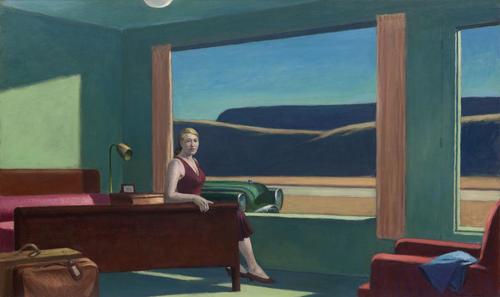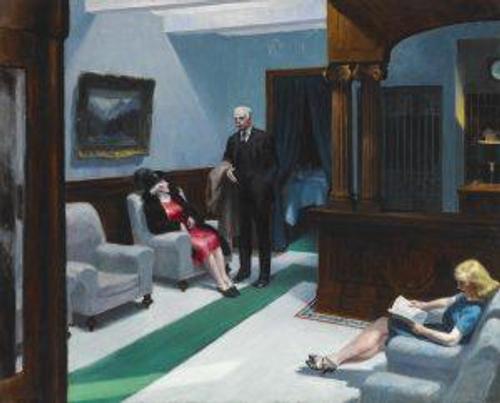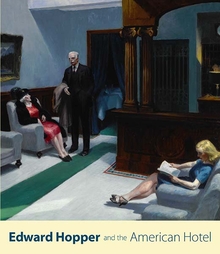Oct. 26, 2019–Feb. 23, 2020
Indianapolis Museum of Art
Oct. 26, 2019–Feb. 23, 2020
The Virginia Museum of Fine Arts has announced that Edward Hopper and the American Hotel will premiere at the museum on Oct. 26—the only east coast venue for this major loan exhibition. Showcasing more than 60 of Hopper’s paintings, drawings, watercolors and illustrations, this groundbreaking exhibition offers a rare opportunity to see several of the acclaimed American artist’s most beloved works in person and in a new context. Edward Hopper and the American Hotel represents the first investigation of the artist’s canonical images of hotels, motels and other hospitality settings, thus expanding the terms of alienation and fragmentation in which Hopper’s art is often discussed. Also included are 35 works by American artists that similarly explore the visual culture of hotels, travel and mobility from the early 20th century to the present. Curated by Dr. Leo G. Mazow, VMFA’s Louise B. and J. Harwood Cochrane Curator of American Art, Edward Hopper and the American Hotel will be on view Oct. 26, 2019–Feb. 23, 2020.

Western Motel, 1957, Edward Hopper (American, 1882–1967), oil on canvas. Yale University Art Gallery, New Haven, Bequest of Stephen C. Clark, B.A., 1903. © 2019. Heirs of Josephine N. Hopper / Artists Rights Society (ARS), NY.
As part of this exhibition, VMFA will recreate Western Motel, one of Hopper’s best-known paintings, as a three-dimensional simulated motel space, giving visitors the chance to “step inside” his work. Through the “Hopper Hotel Experience,” guests will have the opportunity to stay at the museum overnight in a room inspired by Western Motel. There will be a variety of packages available at different price points. Some of the “Hopper Hotel Experience” packages consist of dinner at VMFA’s fine dining restaurant Amuse, a guided tour by the curator and an exhibition catalogue, among other options. Reservation details for the “Hopper Hotel Experience” will be released later this month. This is the first time that VMFA has recreated a work of art in a three-dimensional space and made it available to stay in overnight.

VMFA has had a long relationship with Hopper, starting with his role
as chairman of the jury for the museum’s first biennial exhibition in
1938. In 1953, the artist returned to VMFA as a juror for that year’s
biennale exhibition. At that time, the museum purchased Hopper’s 1935
painting House at Dusk, which will be on view as part of the
exhibition, along with loans from New York’s Whitney Museum of American
Art and Metropolitan Museum of Art; the Philadelphia Museum of Art; the
Thyssen-Bornemisza Museum in Madrid, Spain; and numerous other museums
and private collections. Among the private lenders are Grammy-award
winning musician Bruce Hornsby and his wife Kathy, who are lending six
never-before-exhibited Hopper drawings to the exhibition.

Hotel Window, 1955 by Edward Hopper
“Each of our curators is tasked with creating exhibitions that provide new narratives about the collection and engage visitors with works of art in a unique way,” says Virginia Museum of Fine Arts Director Alex Nyerges. “We are thrilled that through this historic exhibition, VMFA’s visitors will be able to interact with and learn from extraordinary paintings, drawings and illustrations by Hopper, as well as works by renowned artists such as Richard Caton Woodville, John Singer Sargent, Charles Demuth, Reginald Marsh, Edward Ruscha and Cindy Sherman.”

Hotel By A Railroad, Edward Hopper
Edward Hopper and the American Hotel also features selected diaries written by Hopper’s wife and fellow artist, Josephine “Jo” Hopper, which were only recently made available to the public by the Provincetown Art Association and Museum. Jo’s diaries describe not only the drive between their homes in New York and Cape Cod but also their numerous extended road trips throughout the United States and Mexico. Along with her diary entries, the exhibition showcases hotel postcards from the 1920s through the 1950s featuring places that the couple visited together. The postcards and diary entries are rarely seen primary sources that humanize the artist and his wife, providing detailed accounts of their travels in their own words and personal responses to the places they visited, their experiences there and how these trips informed their art.

Hotel Window, 1955 by Edward Hopper
“Each of our curators is tasked with creating exhibitions that provide new narratives about the collection and engage visitors with works of art in a unique way,” says Virginia Museum of Fine Arts Director Alex Nyerges. “We are thrilled that through this historic exhibition, VMFA’s visitors will be able to interact with and learn from extraordinary paintings, drawings and illustrations by Hopper, as well as works by renowned artists such as Richard Caton Woodville, John Singer Sargent, Charles Demuth, Reginald Marsh, Edward Ruscha and Cindy Sherman.”

Hotel By A Railroad, Edward Hopper
Edward Hopper and the American Hotel also features selected diaries written by Hopper’s wife and fellow artist, Josephine “Jo” Hopper, which were only recently made available to the public by the Provincetown Art Association and Museum. Jo’s diaries describe not only the drive between their homes in New York and Cape Cod but also their numerous extended road trips throughout the United States and Mexico. Along with her diary entries, the exhibition showcases hotel postcards from the 1920s through the 1950s featuring places that the couple visited together. The postcards and diary entries are rarely seen primary sources that humanize the artist and his wife, providing detailed accounts of their travels in their own words and personal responses to the places they visited, their experiences there and how these trips informed their art.
“Edward Hopper is one the best-known 20th-century American artists,
yet the public’s conception of him has largely been filtered through a
time-worn biographical formula that explains his art as the product of a
sullen, isolated introvert,” says Mazow. “Edward Hopper and the American Hotel endeavors
to consider hotels, motels and other transient dwellings as vital
subject matter for Hopper and as a framework with which to understand
his entire body of work.”
Catalogue

The painter, draftsman, and illustrator Edward Hopper (1882–1967) is one of America’s best-known and most frequently exhibited artists. Hotels, motels, and tourist homes are recurring motifs in his work, along with streets, lighthouses, and gas stations forming a visual vocabulary of transportation infrastructure. In ten essays, this fascinating volume explores Hopper’s lifelong investigation of such spaces, shedding light on both his professional practice and far-reaching changes in transportation and communications, which affected not only work and leisure but also dynamics of race, class, and gender.
n.
Catalogue

264 pages, 9 1/2 x 11
205 color illus., including 2 removable maps
ISBN: 9780300246889
PB-with Flaps
205 color illus., including 2 removable maps
ISBN: 9780300246889
PB-with Flaps
The accompanying 200-page, fully illustrated exhibition catalogue is
the first publication to show that the artist and his contemporaries
found artistic inspiration and culturally revealing metaphors in the
American hotel and related rental lodgings. The catalogue contains
critical essays on hotel, motel and allied subject matter in Hopper’s
work.
The painter, draftsman, and illustrator Edward Hopper (1882–1967) is one of America’s best-known and most frequently exhibited artists. Hotels, motels, and tourist homes are recurring motifs in his work, along with streets, lighthouses, and gas stations forming a visual vocabulary of transportation infrastructure. In ten essays, this fascinating volume explores Hopper’s lifelong investigation of such spaces, shedding light on both his professional practice and far-reaching changes in transportation and communications, which affected not only work and leisure but also dynamics of race, class, and gender.
Hopper’s covers for the trade journal Hotel Management,
in addition to other well-known works, invite reflection on the
complicated roles of the nascent New Woman; the erasure of hotel work
and workers; contemporary associations of the color white with
cleanliness and purity; the watercolors Hopper made from hotel windows
and rooftops in Mexico; and the broader context of transportation
history. A final section traces journeys that Hopper and his wife, the
artist Josephine “Jo” Nivison Hopper, took by car in the 1940s and
1950s; selected correspondence and quotations from Jo’s diaries join
reproductions of postcards and ephemera illuminating their—and fellow
Americans’—shifting travel habits.
Leo G. Mazow is Louise B. and J. Harwood Cochrane Curator of American Art at the Virginia Museum of Fine Arts, Richmond. His book Thomas Hart Benton and the American Sound won the 2013 Eldredge Prize, awarded by the Smithsonian American Art Museum. In addition to Mazow’s introduction and two essays, the catalogue
includes essays by contributing authors Sarah G. Powers, Jason Weems,
Carmenita Higginbotham, David Brody, Erika Doss and Kirsten M. Jensen.
EXHIBITION SCHEDULE
n.